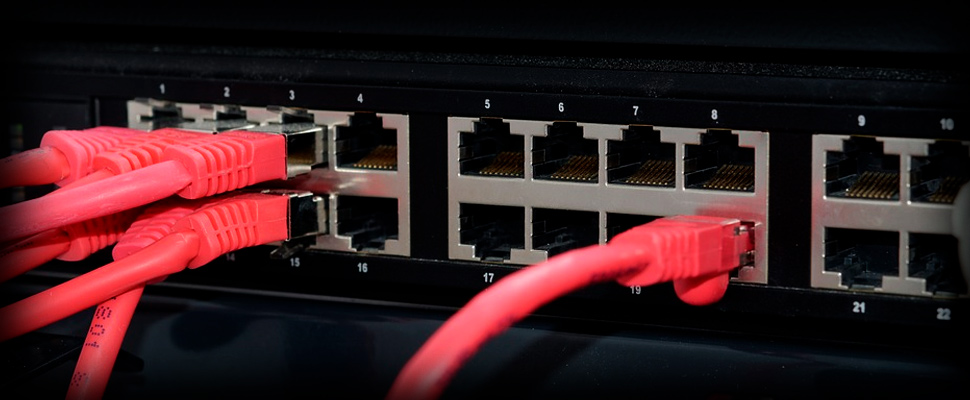Everything you ever wanted to know about net neutrality but never dared to ask
If you've been following tech news in the past couple of years, you've probably heard the phrase "Net Neutrality" an awful lot. That's not a surprise, because this innocent-sounding term refers to a huge battle between advocates of internet freedom, and seekers of online profit.

Hardware equipment with data cables connected. Reference image / Pixabay
Milan Azhar
Listen to this article
Leer en español: Lo que siempre quisiste saber de la neutralidad de la red pero nunca preguntaste
What does Net Neutrality mean?
Net Neutrality is a principle that underlies the structure of the internet, and it's absolutely fundamental to how we conceptualize the online world.
Basically, the idea is that Internet Service Providers must allow all users of the internet at the same level of access to web-based sites and services. There can be no "tiers" of access based around different payments, meaning that small businesses and major corporations should enjoy the same speeds.
It's a little like the principle of road usage. In most cases, roads are free for all vehicle owners to use, and there are no special fees for trucks, cars, or motorbikes (aside from taxes and licensing).
This kind of system has enabled the web to become a global phenomenon, providing free access for website owners and web surfers. Over the years, we've come to take Net Neutrality for granted, but recent times have delivered some worrying wake up calls. The age of Net Neutrality could be coming to an end.
What is the situation regarding Net Neutrality right now?
Ever since the internet became a part of everyday life, companies have started to chafe under the restrictions imposed by Net Neutrality. ISPs have sought ways to commodify their bandwidth, selling faster speeds at premium prices.
Abandoning Net Neutrality would also empower the owners of online infrastructure, putting them in position to ratchet up costs for subscribers and businesses. So it's easy to see why a corporate-funded campaign has developed.
Also read Dinosaurs brought back to life with augmented reality
The Obama administration sought to defuse this campaign, passing regulations to protect Net Neutrality in 2014. These laws tried to classify online connectivity as a "telecommunications service", meaning that the Federal Communications Commission (FCC) would have to protect equal access.
However, when Donald Trump entered the White House, this all changed. Trump has aggressively challenged Net Neutrality, and the FCC has followed suite. But a vibrant movement has emerged in response. Funded by companies like Netflix and powered by concerned global rights groups, the Save the Internet campaign appealed against the FCC, taking the issue to the Supreme Court.
A case lodged in the U.S. Court of Appeals found against the Trump administration but was appealed in turn by the government. This appeal failed in November 2018, when the Supreme Court "refused to hear" the case. At the same time, the Senate has rejected attempts to repeal Net Neutrality. So Obama's regulations are still in place.
But, as we can see, they are increasingly fragile, and more challenges are likely in the future.
Looking forward: Is Net Neutrality doomed?
Should we be preparing for a time when the quality of our internet connections is directly related to our ability to pay? If Trump's reforms proceed, you can bet that the UK and Europe won't last long. The question is, can campaigners and businesses in favor of Net Neutrality make a difference?
According to the Electronic Frontier Foundation, it's not too late. The respected online advocacy group is waging a campaign to persuade Congressional lawmakers in the USA to reject attempts to create a tiered internet. The success of their campaign will largely determine whether online profiteers are victorious.
What can you do if Net Neutrality is abandoned?
Although the future isn't totally bleak, let's assume for a moment that Net Neutrality is destroyed, and we are asked to pay up for "enhanced" internet connections.
If we love streaming movies, downloading torrents, or online gaming, our data demands could rack up massive bills. For many people, that would make using the internet for the activities they love virtually impossible.
So what can be done? Actually, there are some effective solutions. Should the worst happen, you need to know about them.
Use Virtual Private Networks to bypass corporate filters
Above all else, it looks like the abandonment of Net Neutrality will be a big boost for the VPN industry.
Why? Because VPNs hold out the possibility of neutralizing ISPs' pricing strategies. VPNs allow web users to anonymize their IP addresses and to encrypt the data they send. When you combine these properties, they allow you to consume and send data in unlimited quantities without your ISP knowing who is doing the downloading.
To implement an unequal internet, companies will need to track individual users, but VPNs challenge this. Sure, there may be technical developments that cause VPNs to adapt, but at the moment, they are the primary weapon available to protect Net Neutrality in the future.
However, remember to use a reliable VPN – and not just a cheap, or a free app with glitzy marketing. Check out our review of PureVPN, or elite providers like ExpressVPN, NordVPN, or Private Internet Access. With those apps in your locker, you should be in a good position to maintain your online freedom, no matter what happens in Washington, DC.





